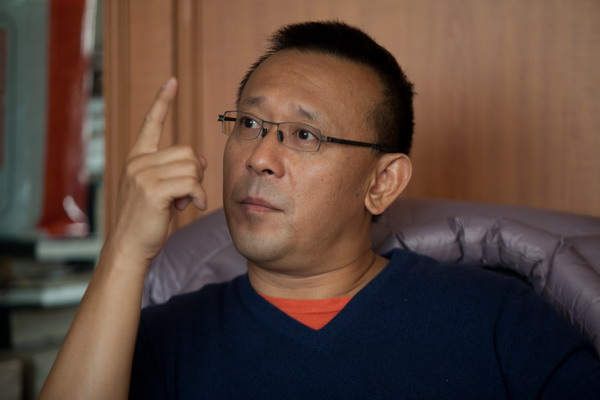A truth that's stranger than fiction
Updated: 2011-02-23 08:13
By Raymond Zhou (China Daily)
|
|||||||||||
|
 Actor-director Jiang Wen in his Beijing office. [Photo/China Daily]
|
The actor-director clearly savors the moment, sitting in his less-than-spacious office cluttered with wooden furniture in Bejing's diplomatic compound while staff members shuffle in and out with all kinds of requests and announcements. His sangfroid is not disturbed even when told of an award for the film.
He does not need others to tell him how great he is - not any more.
Yet Jiang Wen is bitter - bitter about how his previous feature was received. He tries not to show it, but brings two members of his Bullets team into our conversation because "they were also involved in The Sun Also Rises".
And I suspect I have been granted this three-hour post-premiere rare interview mainly because I, as a movie critic, had praised The Sun Also Rises as the high point of his remarkable directing career - although it was not understood by most of its audience.
Most people would call the 2007 The Sun Also Rises an art-house film and the new one a genre movie, even though it does not fit neatly into an existing genre - gangster, heist or Chinese western.
Jiang laughs off such attempts at categorization. He uses a scene from Once Upon a Time in America in which Robert De Niro's character takes a girl to a fancy restaurant and overwhelms her with a live band and exclusive use of the venue.
"With The Sun, I gave my heart and soul. I thought the audience would appreciate it and would not mind sitting on the grass by the river, so to speak. But to my chagrin, they were just like the girl in the De Niro film. They wanted the limo and the band even though they may not have good taste in music. They tended to equate the bells and whistles with real love. So, with Bullets I gave them the treatment they preferred," Jiang says, changing his use of the term for "girl" from the folksy niu er to an ostensibly chic but innately tacky meimei before the end of the interview.
That does not mean he is not proud of Bullets. It's just that Bullets, for him, is fun while The Sun is dead serious. He is aware of all the political interpretations of his story that have sprung up across the Web and mainstream media. In 2007, I wrote a Freudian analysis of The Sun, and his response was condensed into a single word - "Sharp" - without elaboration. This time, I was intent on getting to the bottom of the affair.
"No, I did not mean to embed political meanings into the story," he says straightforwardly. When asked about one detailed reading that supplied a background link between the two characters and how they joined the 1911 Revolution together, Jiang pauses, saying he is fine with this kind of creative annotation, but "the focus is too narrow".















